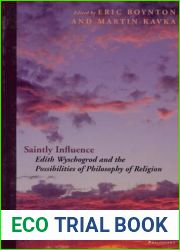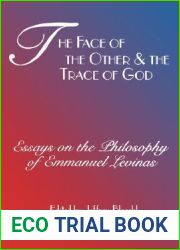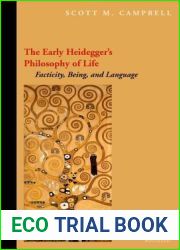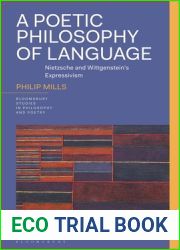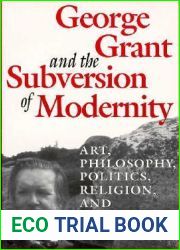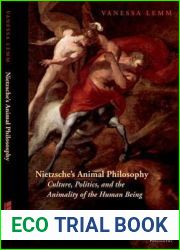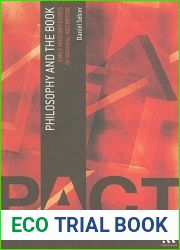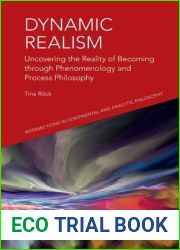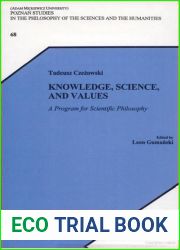
BOOKS - Divination and Philosophy in the Letters of Paul (Edinburgh Studies in Religi...

Divination and Philosophy in the Letters of Paul (Edinburgh Studies in Religion in Antiquity)
Author: Matthew Sharp
Year: January 18, 2023
Format: PDF
File size: PDF 1.7 MB
Language: English

Year: January 18, 2023
Format: PDF
File size: PDF 1.7 MB
Language: English

The book "Divination and Philosophy in the Letters of Paul: Edinburgh Studies in Religion in Antiquity" offers a unique perspective on the apostle Paul's claims to receive and interpret knowledge from divine sources, set within the context of divination in the Graeco-Roman world. The author examines the underlying logic of divination in ancient philosophical conversations, visionary experiences, prophecy, and divine speech, providing an in-depth study of divine communication in Paul's letters. This book is significant because it challenges traditional theological categories, such as "revelation which have isolated early Christianity from its historical context in the Graeco-Roman world. Instead, the author re-reads Paul's thought and practice concerning divine communication within the context of Graeco-Roman divination, revealing the coherence and connections between Paul's letters and their historical context. The book is divided into chapters, each of which explores a particular aspect of divination in Paul's letters, comparing them with similar phenomena in the Graeco-Roman world. For example, one chapter discusses the logic of divination in the context of ancient philosophical conversations, while another explores the use of texts and interpretation of signs in divination. By doing so, the author sheds light on the connections between Paul's thought and practice and the broader topics of cosmology, anthropology, eschatology, and theology.
Книга «Гадание и философия в письмах Павла: Эдинбургские исследования в области религии в древности» предлагает уникальный взгляд на заявления апостола Павла о получении и интерпретации знаний из божественных источников, установленных в контексте гадания в греко-римском мире. Автор рассматривает лежащую в основе логику гадания в древних философских разговорах, визионерских переживаниях, пророчествах и божественной речи, предоставляя углубленное изучение божественного общения в письмах Павла. Эта книга важна, потому что она бросает вызов традиционным богословским категориям, таким как «откровение», которые изолировали раннее христианство от его исторического контекста в греко-римском мире. Вместо этого автор перечитывает мысли и практику Павла относительно божественного общения в контексте греко-римского гадания, выявляя согласованность и связи между письмами Павла и их историческим контекстом. Книга разделена на главы, каждая из которых исследует тот или иной аспект гадания в письмах Павла, сравнивая их с аналогичными явлениями в греко-римском мире. Например, в одной главе обсуждается логика гадания в контексте древних философских бесед, а в другой исследуется использование текстов и интерпретация знаков в гадании. Тем самым автор проливает свет на связи между мыслью и практикой Павла и более широкими темами космологии, антропологии, эсхатологии и теологии.
livre « La divination et la philosophie dans les lettres de Paul : Études d'Edimbourg dans le domaine de la religion dans l'antiquité » offre un regard unique sur les déclarations de l'apôtre Paul sur la réception et l'interprétation des connaissances de sources divines établies dans le contexte de la divination dans le monde gréco-romain. L'auteur examine la logique sous-jacente de la divination dans les conversations philosophiques antiques, les expériences visionnaires, les prophéties et le discours divin, en fournissant une étude approfondie de la communication divine dans les lettres de Paul. Ce livre est important parce qu'il remet en question les catégories théologiques traditionnelles, comme la « révélation », qui ont isolé le christianisme primitif de son contexte historique dans le monde gréco-romain. Au lieu de cela, l'auteur relit la pensée et la pratique de Paul concernant la communication divine dans le contexte de la divination gréco-romaine, révélant la cohérence et les liens entre les lettres de Paul et leur contexte historique. livre est divisé en chapitres, chacun examinant un aspect particulier de la divination dans les lettres de Paul, les comparant à des phénomènes similaires dans le monde gréco-romain. Par exemple, un chapitre traite de la logique de la divination dans le contexte des conversations philosophiques antiques, tandis qu'un autre examine l'utilisation des textes et l'interprétation des signes dans la divination. L'auteur met ainsi en lumière les liens entre la pensée et la pratique de Paul et les thèmes plus larges de la cosmologie, de l'anthropologie, de l'eschatologie et de la théologie.
libro «Adivinación y filosofía en las cartas de Pablo: Estudios de Edimburgo en el campo de la religión en la antigüedad» ofrece una visión única de las declaraciones del apóstol Pablo sobre la obtención e interpretación del conocimiento de las fuentes divinas establecidas en el contexto de la adivinación en el mundo grecorromano. autor examina la lógica subyacente de la adivinación en las antiguas conversaciones filosóficas, experiencias visionarias, profecías y discurso divino, proporcionando un estudio profundo de la comunión divina en las cartas de Pablo. Este libro es importante porque desafía las categorías teológicas tradicionales, como la «revelación», que aislaron al cristianismo primitivo de su contexto histórico en el mundo grecorromano. En cambio, el autor relea los pensamientos y prácticas de Pablo sobre la comunicación divina en el contexto de la adivinación grecorromana, revelando la coherencia y las conexiones entre las cartas de Pablo y su contexto histórico. libro se divide en capítulos, cada uno de los cuales explora un aspecto particular de la adivinación en las cartas de Pablo, comparándolas con fenómenos similares en el mundo grecorromano. Por ejemplo, un capítulo discute la lógica de la adivinación en el contexto de las conversaciones filosóficas antiguas, mientras que otro explora el uso de textos y la interpretación de signos en la adivinación. Al hacerlo, el autor arroja luz sobre las conexiones entre el pensamiento y la práctica de Pablo y los temas más amplios de la cosmología, la antropología, la escatología y la teología.
O livro «Adivinhação e filosofia nas cartas de Paulo: Estudos de Edimburgo sobre Religião na Antiguidade» oferece uma visão única das declarações do apóstolo Paulo sobre a obtenção e interpretação do conhecimento das fontes divinas estabelecidas no contexto da adivinhação no mundo grego-romano. O autor aborda a lógica subjacente da adivinhação nas antigas conversas filosóficas, experiências visionárias, profecias e fala divina, fornecendo um estudo aprofundado da comunicação divina nas cartas de Paulo. Este livro é importante porque desafia categorias teológicas tradicionais, como a «revelação», que isolaram o cristianismo precoce do seu contexto histórico no mundo grego-romano. Em vez disso, o autor relê os pensamentos e as práticas de Paulo sobre a comunicação divina no contexto da adivinhação greco-romana, revelando a coerência e os laços entre as cartas de Paulo e seu contexto histórico. O livro é dividido em capítulos, cada um dos quais explora um aspecto da adivinhação nas cartas de Paulo, comparando-os com ocorrências semelhantes no mundo grego-romano. Por exemplo, um capítulo discute a lógica da adivinhação no contexto de conversas filosóficas antigas, enquanto outro explora o uso de textos e a interpretação de sinais na adivinhação. Com isso, o autor esclarece os laços entre o pensamento e a prática de Paulo e os temas mais amplos da cosmologia, antropologia, esquatologia e teologia.
Il libro «L'indovinazione e la filosofia nelle lettere di Paolo: Studi di Edimburgo sulla religione nell'antichità» offre una visione unica delle dichiarazioni dell'apostolo Paolo circa l'acquisizione e l'interpretazione delle conoscenze da fonti divine stabilite nel contesto dell'indovinazione nel mondo greco-romano. L'autore affronta la logica sottostante di indovinare in antiche conversazioni filosofiche, esperienze visionarie, profezie e discorsi divini, fornendo uno studio approfondito della comunicazione divina nelle lettere di Paolo. Questo libro è importante perché sfida le categorie teologiche tradizionali, come la rivelazione, che hanno isolato il cristianesimo precoce dal suo contesto storico nel mondo greco-romano. L'autore rilegge invece i pensieri e le pratiche di Paolo riguardo la comunicazione divina nel contesto della suggestione greco-romana, individuando la coerenza e i legami tra le lettere di Paolo e il loro contesto storico. Il libro è suddiviso in capitoli, ognuno dei quali esamina un aspetto dell'indovinazione nelle lettere di Paolo, confrontandoli con fenomeni simili nel mondo greco-romano. Ad esempio, in un capitolo si discute la logica dell'intuizione nel contesto di antiche conversazioni filosofiche, mentre in un altro si esamina l'uso dei testi e l'interpretazione dei segni nella suggestione. In questo modo l'autore mette in luce i legami tra il pensiero e la pratica di Paolo e i temi più ampi della cosmologia, dell'antropologia, dell'eschatologia e della teologia.
Das Buch Wahrsagerei und Philosophie in Pauls Briefen: Edinburgh Studies on Religion in Antiquities bietet einen einzigartigen Einblick in die Aussagen des Apostels Paulus über den Erwerb und die Interpretation von Wissen aus göttlichen Quellen, die im Kontext der Wahrsagerei in der griechisch-römischen Welt etabliert sind. Der Autor untersucht die zugrunde liegende Logik der Wahrsagerei in alten philosophischen Gesprächen, visionären Erfahrungen, Prophezeiungen und göttlicher Rede und bietet eine eingehende Untersuchung der göttlichen Gemeinschaft in den Briefen des Paulus. Dieses Buch ist wichtig, weil es traditionelle theologische Kategorien wie „Offenbarung“ herausfordert, die das frühe Christentum aus seinem historischen Kontext in der griechisch-römischen Welt isoliert haben. Stattdessen liest der Autor die Gedanken und Praktiken des Paulus in Bezug auf die göttliche Gemeinschaft im Kontext der griechisch-römischen Wahrsagerei erneut und zeigt die Kohärenz und die Verbindungen zwischen den Briefen des Paulus und ihrem historischen Kontext auf. Das Buch ist in Kapitel unterteilt, von denen jedes einen bestimmten Aspekt der Wahrsagerei in den Briefen des Paulus untersucht und sie mit ähnlichen Phänomenen in der griechisch-römischen Welt vergleicht. Zum Beispiel diskutiert ein Kapitel die Logik der Wahrsagerei im Kontext alter philosophischer Gespräche, während ein anderes die Verwendung von Texten und die Interpretation von Zeichen in der Wahrsagerei untersucht. Dabei beleuchtet der Autor die Zusammenhänge zwischen dem Denken und der Praxis des Paulus und den weiteren Themen der Kosmologie, Anthropologie, Eschatologie und Theologie.
Książka „Wróżenie i filozofia w listach Pawła: Studia z Edynburga nad religią w starożytności” oferuje wyjątkową perspektywę na twierdzenia apostoła Pawła o nabywaniu i interpretowaniu wiedzy ze źródeł Bożych ustanowionych w kontekście wróżby w świecie greko-rzymskim. Autor rozważa podstawową logikę wróżenia w starożytnych rozmowach filozoficznych, doświadczeniach wizjonerskich, proroctwach i mowie Bożej, zapewniając dogłębne studium Boskiej komunii w listach Pawła. Książka ta jest ważna, ponieważ kwestionuje tradycyjne kategorie teologiczne, takie jak „objawienie”, które odizolowało wczesne chrześcijaństwo od historycznego kontekstu w świecie greko-rzymskim. Zamiast tego autor powtarza myśli i praktyki Pawła dotyczące Boskiej komunii w kontekście wróżby greko-rzymskiej, ujawniając spójność i powiązania między listami Pawła a ich kontekstem historycznym. Księga podzielona jest na rozdziały, z których każdy bada konkretny aspekt wróżby w listach Pawła, porównując je do podobnych zjawisk w świecie greko-rzymskim. Na przykład, jeden rozdział omawia logikę wróżenia w kontekście starożytnych rozmów filozoficznych, podczas gdy drugi bada użycie tekstów i interpretację znaków w wróżbie. Autor rzuca więc światło na powiązania myśli i praktyki Pawła z szerszymi tematami kosmologii, antropologii, eschatologii i teologii.
הספר ”הגדת עתידות ופילוסופיה באיגרות פאולוס: לימודי אדינבורו בדת בימי קדם” מציע נקודת מבט ייחודית על טענותיו של השליח פאולוס לרכוש ולפרש ידע ממקורות אלוהיים שנוסדו בהקשר של הגדת עתידות בעולם היווני ־ רומי. המחבר רואה את ההיגיון הבסיסי של הגדת עתידות בשיחות פילוסופיות קדומות, חוויות חזוניות, נבואות ודיבור אלוהי, המספקות מחקר מעמיק של לחם הקודש האלוהי באיגרותיו של פאולוס. ספר זה חשוב משום שהוא מאתגר קטגוריות תיאולוגיות מסורתיות כמו ”התגלות”, אשר בודדה את הנצרות הקדומה מהקשריה ההיסטוריים בעולם היווני-רומי. במקום זאת, המחבר קורא מחדש את מחשבותיו של פאולוס ואת מנהגו בנוגע לקשר האלוהי בהקשר של הגדת עתידות יוונית-רומית, וחושף קוהרנטיות וקשרים בין איגרותיו של פאולוס לבין ההקשר ההיסטורי שלהם. הספר מחולק לפרקים, שכל אחד מהם חוקר היבט מסוים של הגדת עתידות באיגרותיו של פאולוס, ומשווה אותם לתופעות דומות בעולם היווני-רומי. לדוגמה, פרק אחד דן בהיגיון של הגדת עתידות בהקשר של שיחות פילוסופיות קדומות, ואילו פרק אחר בוחן את השימוש בטקסטים ואת הפרשנות של אותות בחיזוי עתידות. לפיכך, המחבר שופך אור על הקשרים בין המחשבה והפרקטיקה של פאולוס לבין הנושאים הרחבים יותר של קוסמולוגיה, אנתרופולוגיה, אסכטולוגיה ותיאולוגיה.''
"Paul'un Mektuplarında Kehanet ve Felsefe: Antik Çağda Din Üzerine Edinburgh Çalışmaları" kitabı, Havari Pavlus'un Greko-Romen dünyasında kehanet bağlamında kurulan ilahi kaynaklardan bilgi edinme ve yorumlama iddialarına benzersiz bir bakış açısı sunuyor. Yazar, eski felsefi konuşmalarda, vizyoner deneyimlerde, kehanetlerde ve ilahi konuşmada kehanetin altında yatan mantığı ele alarak, Pavlus'un mektuplarında ilahi birlikteliğin derinlemesine incelenmesini sağlar. Bu kitap önemlidir, çünkü erken Hıristiyanlığı Greko-Romen dünyasındaki tarihsel bağlamından izole eden "vahiy'gibi geleneksel teolojik kategorilere meydan okumaktadır. Bunun yerine, yazar, Greko-Romen kehanet bağlamında Pavlus'un ilahi birlik hakkındaki düşüncelerini ve uygulamalarını yeniden okuyarak, Pavlus'un mektupları ile tarihsel bağlamları arasındaki tutarlılığı ve bağlantıları ortaya koyuyor. Kitap, her biri Pavlus'un mektuplarındaki kehanetin belirli bir yönünü araştıran ve onları Greko-Romen dünyasındaki benzer fenomenlerle karşılaştıran bölümlere ayrılmıştır. Örneğin, bir bölüm eski felsefi konuşmalar bağlamında kehanet mantığını tartışırken, bir diğeri metinlerin kullanımını ve işaretlerin kehanette yorumlanmasını inceler. Böylece yazar, Pavlus'un düşünce ve pratiği ile kozmoloji, antropoloji, eskatoloji ve teolojinin daha geniş konuları arasındaki bağlantılara ışık tutuyor.
يقدم كتاب «العرافة والفلسفة في رسائل بولس: دراسات إدنبرة في الدين في العصور القديمة» منظورًا فريدًا لادعاءات الرسول بولس باكتساب المعرفة وتفسيرها من المصادر الإلهية المنشأة في سياق العرافة في العالم اليوناني الروماني. يأخذ المؤلف في الاعتبار المنطق الأساسي للعرافة في المحادثات الفلسفية القديمة والتجارب البصيرة والنبوءات والخطاب الإلهي، مما يوفر دراسة متعمقة للتواصل الإلهي في رسائل بولس. هذا الكتاب مهم لأنه يتحدى الفئات اللاهوتية التقليدية مثل «الوحي»، الذي عزل المسيحية المبكرة عن سياقها التاريخي في العالم اليوناني الروماني. بدلاً من ذلك، أعاد المؤلف قراءة أفكار بولس وممارسته فيما يتعلق بالمشاركة الإلهية في سياق العرافة اليونانية الرومانية، وكشف عن التماسك والصلات بين رسائل بولس وسياقها التاريخي. ينقسم الكتاب إلى فصول، يستكشف كل منها جانبًا معينًا من العرافة في رسائل بولس، ويقارنها بظواهر مماثلة في العالم اليوناني الروماني. على سبيل المثال، يناقش أحد الفصول منطق العرافة في سياق المحادثات الفلسفية القديمة، بينما يبحث آخر في استخدام النصوص وتفسير العلامات في العرافة. وهكذا، يلقي المؤلف الضوء على الروابط بين فكر وممارسة بولس والمواضيع الأوسع لعلم الكونيات والأنثروبولوجيا وعلم الأخرويات وعلم اللاهوت.
"바울의 편지에 담배와 철학: 고대 종교에 관한 에딘버러 연구" 라는 책은 그레코-로마 세계의 점의 맥락에서 확립 된 신성한 근원으로부터 지식을 습득하고 해석하려는 사도 바울의 주장에 대한 독특한 관점을 제공합니다. 저자는 고대 철학적 대화, 비전 경험, 예언 및 신성한 연설에서 점의 기본 논리를 고려하여 바울의 편지에서 신성한 친교에 대한 심층적 인 연구를 제공합니다. 이 책은 초기 기독교를 그레코-로마 세계의 역사적 맥락에서 분리 한 "계시" 와 같은 전통적인 신학 적 범주에 도전하기 때문에 중요합니다. 대신, 저자는 그레코-로마 점의 맥락에서 신성한 친교에 관한 바울의 생각과 실천을 다시 읽으며, 바울의 편지와 역사적 맥락 사이의 일관성과 연관성을 보여줍니다. 이 책은 챕터로 나뉘며, 각각은 바울의 편지에서 점의 특정 측면을 탐구하여 그리스-로마 세계의 유사한 현상과 비교합니다. 예를 들어, 한 장은 고대 철학적 대화의 맥락에서 점의 논리를 논의하는 반면, 다른 장은 점의 사용과 점의 표시 해석을 조사합니다. 따라서 저자는 바울의 생각과 실천과 우주론, 인류학, 종말론 및 신학의 광범위한 주제 사이의 연관성을 밝힙니다.
「パウロの手紙における占いと哲学:古代の宗教におけるエディンバラ研究」は、グレコ・ローマ世界における占いの文脈で確立された神の源から知識を獲得し、解釈するという使徒パウロの主張に独特の視点を提供しています。著者は、古代の哲学的会話、先見的な経験、預言、神のスピーチにおける占いの根底にある論理を考慮し、パウロの手紙の中で神の交わりについての詳細な研究を提供します。この本は、グレコ・ローマ世界における初期キリスト教の歴史的文脈から孤立した「啓示」などの伝統的な神学的分類に挑戦しているため、重要である。代わりに、著者は、グレコ・ローマ占いの文脈における神の聖体拝領に関するパウロの考えと実践を再読み込み、パウロの手紙とその歴史的文脈の間の一貫性と関係を明らかにします。この本は章に分けられ、それぞれがパウロの手紙の中で占いの特定の側面を探求し、それらをグレコ・ローマ世界の同様の現象と比較しています。例えば、ある章では古代の哲学的会話の文脈における占いの論理を論じ、別の章では占いにおけるテキストの使用と徴候の解釈を検討します。したがって、著者は、パウロの思考と実践と、宇宙論、人類学、偶像学、神学のより広いトピックとの間の関係に光を当てています。
《保羅信中的占蔔與哲學:古代愛丁堡宗教研究》一書提供了使徒保羅關於從希臘羅馬世界占蔔背景中建立的神聖來源獲取和解釋知識的聲明的獨特觀點。作者回顧了古代哲學對話,有遠見的經歷,預言和神話中的占蔔的基本邏輯,在保羅的信中深入研究了神聖的交流。這本書之所以重要,是因為它挑戰了傳統的神學類別,例如「啟示」,這些類別將早期基督教與希臘羅馬世界的歷史背景隔離開來。相反,作者重新閱讀了保羅在希臘羅馬占蔔背景下關於神聖交流的思想和實踐,揭示了保羅的信件與其歷史背景之間的連貫性和聯系。這本書分為幾章,每章都探討了保羅的信件中占蔔的特定方面,並將它們與希臘羅馬世界的類似現象進行了比較。例如,一章討論了古代哲學對話中的占蔔邏輯,另一章探討了占蔔中文本的使用和符號的解釋。因此,作者闡明了保羅的思想和實踐與宇宙學,人類學,末世論和神學的更廣泛主題之間的聯系。







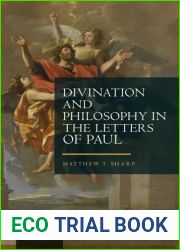



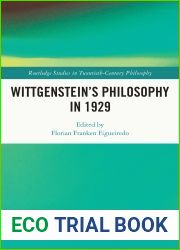
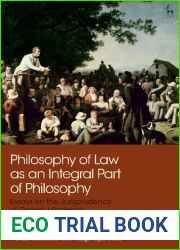
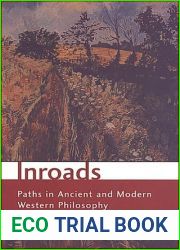
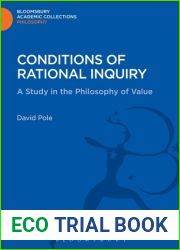
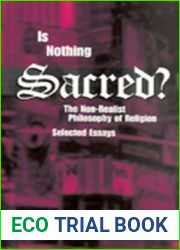
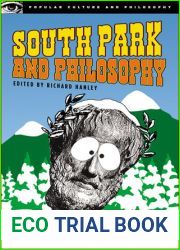

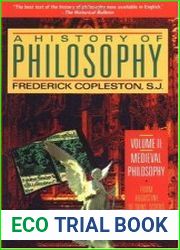
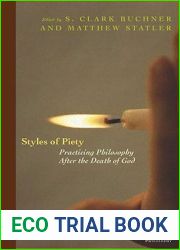


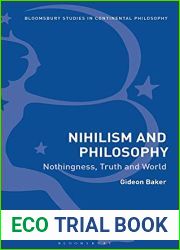
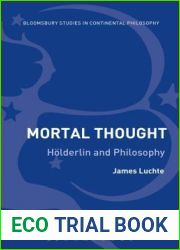

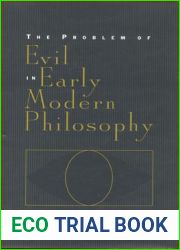
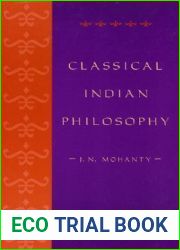

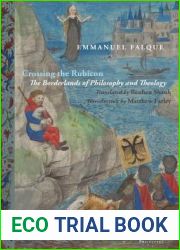
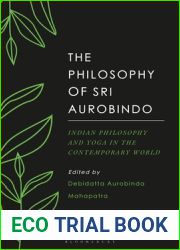
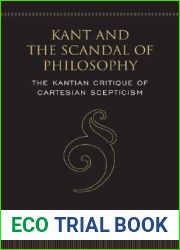



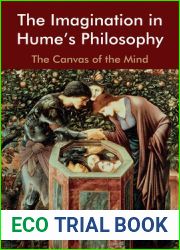

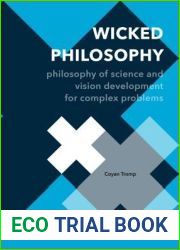
![The Category of the Aesthetic in the Philosophy of Saint Bonaventure [Franciscan Institute Publications, Philosophy Series No. 11] The Category of the Aesthetic in the Philosophy of Saint Bonaventure [Franciscan Institute Publications, Philosophy Series No. 11]](https://myecobook.life/img/5/553214_oc.jpg)

